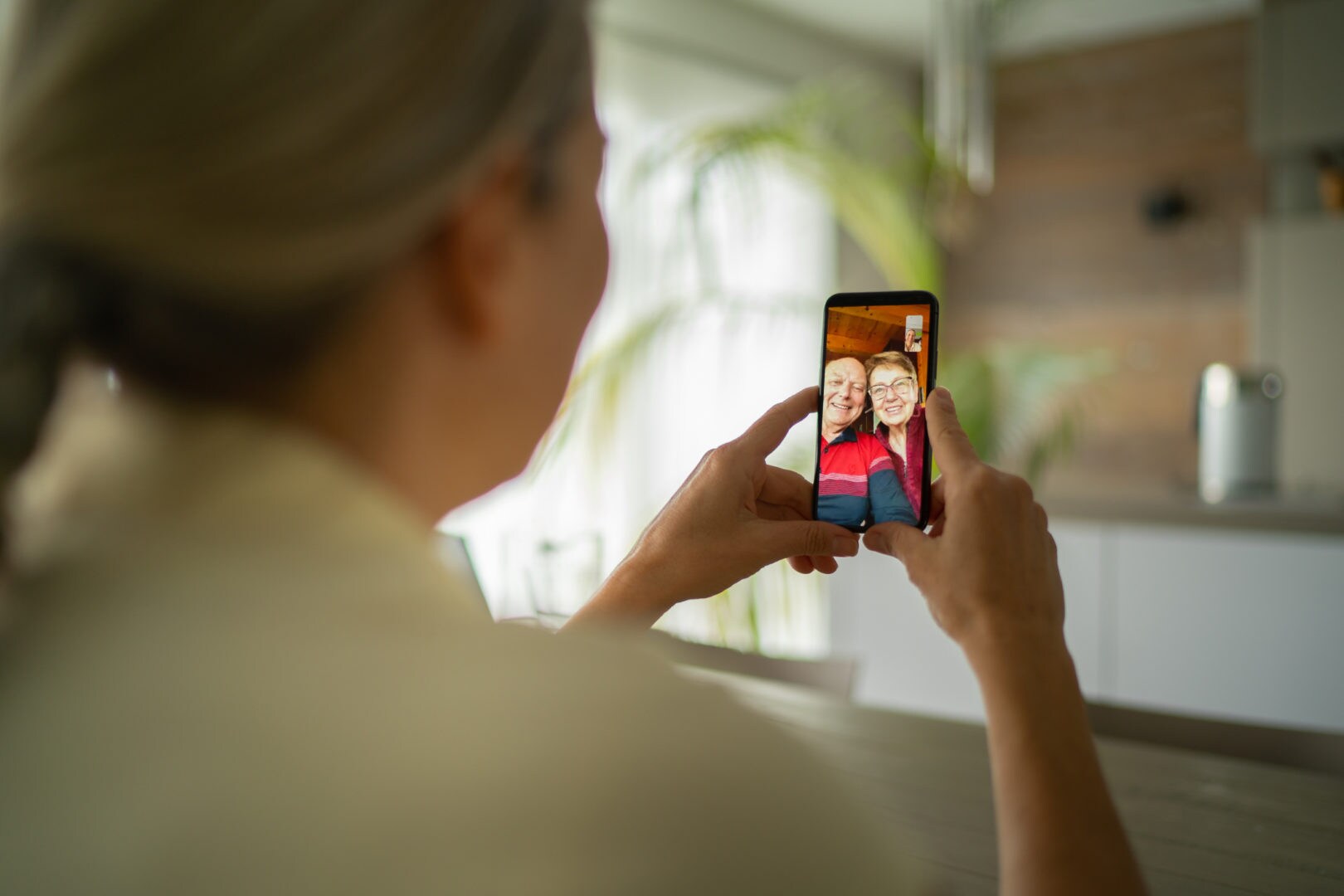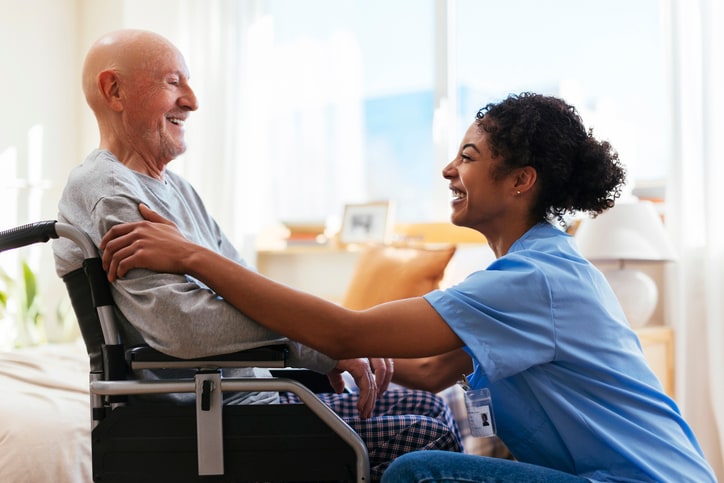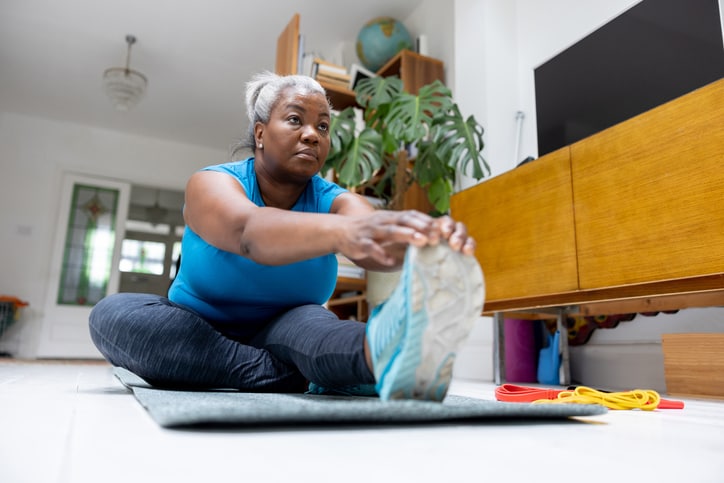Caregiving is never simple, but being hundreds of miles away from your loved one can make it extra challenging. According to a 2020 AARP Research Report, some 11% of caregivers live more than an hour away from the person they care for. Fortunately, there are plenty of ways that you can tend to a parent or other family member even when you can’t be there every minute.
1. Find your point person
You need someone who can check in if there is an emergency or if nobody is picking up the phone. This might be a neighbor or a friend. Or it might be someone you hire.
One option is to hire a geriatric care manager. Sometimes called elder care coordinators or aging life care professionals, geriatric care managers are usually nurses or social workers who have worked in elder care for a number of years and have a network of professionals they can call on to help you out. In some cases, they will even get up from their desks and drive over to your loved one’s house, if necessary. If something goes sideways and you can’t be there right away, these boots on the ground can literally be a lifesaver.
You can also hire a home care aide or other in-home provider to handle more of the day-to-day tasks, like helping your loved one with medication, taking care of housework or assisting with bathing and other personal care.
2. Gain permission to get information
When you can’t go to every doctor’s appointment, it can be hard to stay in the loop. A few key documents will give you the ability to get information about your loved one’s health and finances, even from a distance.
A durable power of attorney will give you the authority to make financial and legal decisions on your loved one’s behalf, including accessing their accounts, writing checks, and doing anything else you need to do to help manage their finances and legal matters. It also enables you to take over completely if they are incapacitated.
You’ll also want to have permission to access their health information. This is important if, for example, you want to be able to call up your parent’s doctor and discuss their latest test results. Federal law does allow health care professionals to use their judgment when discussing or sharing a person’s health information with family and friends. But to be absolutely safe, your loved one should sign a HIPAA release form with any health care provider you might need to speak to, authorizing that provider to share information with you. (Some health care proxy forms also include a HIPAA clause.)
For both of these documents, make sure that you have two copies, one for your loved one to keep and one for your own records.
3. Work the internet
Now that you have their official permission, take a stack of your loved one’s monthly household bills — phone, cable TV, utilities — and figure out how to set up online access to each one, as well as their bank account. You can then log in no matter where you are, check if bills are paid and watch for suspicious activity like unusual withdrawals.
Then, if for any reason, you need to get on the phone, initiate a three-way conference call with your loved one and any of these companies in order to help guide the conversation.
4. Embrace tech
When you’re looking out for someone long-distance, apps and web-based services can be your best friend. From the other side of the country, you can order loved ones groceries via Instacart, glasses via Zenni Optical or refills of their medication via Walgreens. You can find housecleaners, use TaskRabbit to find gig workers who can tackle problems around the house or order through Postmates or GrubHub to have a meal delivered to anyone’s door. You can even book (and pay for) an Uber or Lyft to take your mom to her bridge game.
There’s also a wide range of technology to help monitor a senior’s well-being from afar. Options include everything from heath monitors and pill dispensers to sensors that tell you if the stove has been left on to GPS trackers that let you know if a person with dementia has wandered out of the house.
5. Create a master file
To help you keep track, gather all the information related to your loved one’s care in one place. It doesn’t have to be in a fancy digital vault—an old-fashioned accordion file will do. You may want to include:
- Details of how to access their online accounts
- Copies of their power of attorney, HIPAA releases and other important documents
- Insurance information, including Medicare, Medicaid, long-term care insurance
- Phone numbers of doctors and other medical professionals
- A list of medications
- Important test results
- Schedule of appointments
- Contact info for their assisted living facility or nursing home and copies of contracts
- Contact info for other helpers (friends, neighbors, home health aides, the dog walker, the kid who mows the lawn)
6. Book trips in advance
You may have your own job, life and kids, but you can use your visit time to everyone’s advantage by pre-booking appointments and taking care of household matters. Set your dates to visit well ahead of time, and schedule appointments with your point person, your loved one’s doctors and therapists and anyone else — the estate planning attorney, the contractor who’s supposed to fix the shower — you would like to touch base with.
Face-to-face time with your loved one’s regular doctors will make it easier to ask about what’s on your mind and help your parent or other loved one manage their conditions. And all of these personal contacts should give you more peace of mind that everything is under control and your loved one is in good hands — beyond yours.





